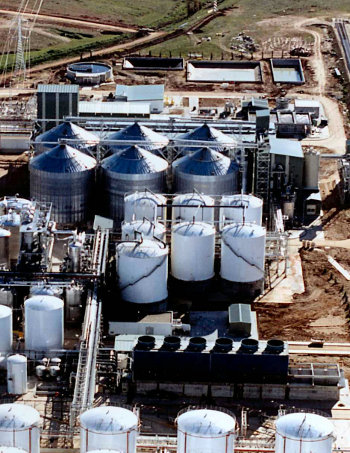The bio-ethanol plant construction was started by Biocarburantes of Castilla y León S.A., formed 50% by Abengoa Bioenergía and 50% by Ebro Puleva, is operating at full capacity since September of 2009 after the end of the last phase assembly, in which the bio-ethanol production was carried aut by the utilization of raw material like barley or wheat straw. During the month of September Abengoa bought the other 50% of Ebro Puleva shares staying with full ownership of the plant.
 In 2003 the construction of this new bio-ethanol plant in Babilafuente (Salamanca) was started. This bio-fuel is obtained from wheat and barley and is directly destined to be mixed with gasoline.
In 2003 the construction of this new bio-ethanol plant in Babilafuente (Salamanca) was started. This bio-fuel is obtained from wheat and barley and is directly destined to be mixed with gasoline.
Stolz took part in the first building work with the installation of the cereal reception area prepared to trucks and wagons. Stolz also carried out the construction of the storage area with six silos of 65.000 tons and two daily silos of 523 m3 each, the building of pre-cleaning, cleaning and cereals grinding. The capacity of reception, cleaning and filling of silos is 300 t/h, being the nominal capacity of grinding 81 t/h, using three 450 Kw hammer mills and a fourth mill on standby.
In addition, Stolz was responsible of the DDGS pelletizing building construction, the pneumatic transport of flour in the dryers outlet and the filling of the flour warehouse and expedition of DDGS pellets wagons. The nominal capacity of pelletizing is 33 t/h, using two pelleting presses of 355 Kw each based on two presses in operation and one on standby.
This plant became operational in 2006, with a bio-ethanol annual production of 200 millions of liters, a DDGS production capacity of 656 t/d and an electrical energy production to be self-sufficient and export to the mains about 150.000 mw hour/year.
Some years later, and attached to this plant, Abengoa Bioenergy built another bio-ethanol production plant whose raw materials were barley straw and wheat straw. In this projects, Stolz installed straw bales power strips, automatic cutter-ropes, straw bales mill, refining mill, pneumatic transport system, lung ground straw silos and a feeding humidifier process conveyor.
The construction of this plant was finished in December 2008 with a bio-ethanol capacity production of five millions of annual liters. It is a global pioneering way of enhancing certain agricultural and forestry residues.
The union of these two buildings makes this project the first worldwide plant to produce some of bio-ethanol from straw (second generation bio-fuel).